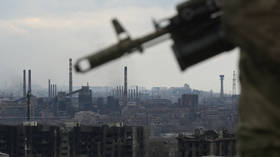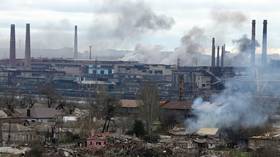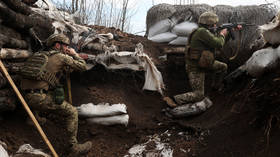Putin calls off assault on Ukraine's last Mariupol hold out

Russian President Vladimir Putin has called off an assault on the Azovstal steel plant in the Black Sea port of Mariupol during a meeting with Defense Minister Sergey Shoigu on Thursday. The facility still harbors some 2,000 Ukrainian militants, including the neo-Nazi 'Azov' regiment, according to Shoigu.
“We always need to think about preserving the lives and health of our soldiers and officers," Putin told the defense chief, adding that, in this particular case, they should not be sent to assault the steel plant.
“One should not get into those catacombs and crawl there underground, in these industrial facilities," the president said. Built back in Soviet times, the Azovstal steel plant has a vast network of well-fortified underground tunnels built to withstand heavy bombardments. An aide to the government of the Donetsk People's Republic, Yan Gagin, had once described these tunnels as an underground city.
Retreating Ukrainian forces, including the notorious Neo-Nazi Azov regiment, have entrenched themselves in these tunnels and have since used them as their last line of defense. On Thursday, Shoigu told Putin that Russian forces and the Donbass republics' militias have fully seized the city of Mariupol, except for the Azovstal plant complex.
Shoigu has also said that a military operation at the plant could be finished in three to four days, apparently planning to storm the facility. Putin has instead ordered his troops to "seal the area so that a fly cannot get through."
The president has also offered those entrenched at the plant another chance to surrender. "Offer anyone, who has not laid down their arms yet, to do that," he has told Shoigu, adding that Russia "guarantees them their lives as well as decent treatment under all international norms." Those injured will also get "qualified medical treatment," the president added.
Russia has twice sought to organize humanitarian corridors for those willing to exit the Azovstal plant over the past few days, but both attempts failed. Instead, the Azov militants and the Ukrainian forces demanded they be allowed to leave through the assistance of an unnamed "third party" while also keeping their personal weapons. Kiev has also blamed Moscow for the fact that attempts to create humanitarian corridors had failed.
Russia attacked its neighbor following Ukraine's failure to implement the terms of the Minsk agreements, signed in 2014, and Moscow's eventual recognition of the Donbass republics of Donetsk and Lugansk. The German and French brokered Minsk Protocol was designed to give the breakaway regions special status within the Ukrainian state.
The Kremlin has since demanded that Ukraine officially declare itself a neutral country that will never join the US-led NATO military bloc. Kiev insists the Russian offensive was completely unprovoked and has denied claims it was planning to retake the two republics by force.














